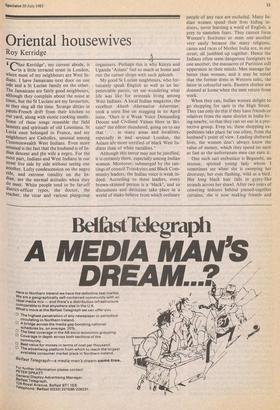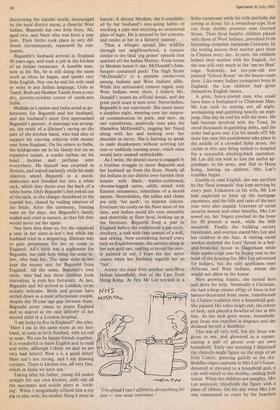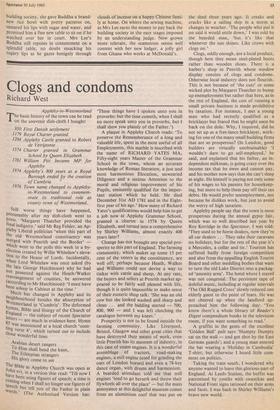Oriental housewives
Roy Kerridge
Chez Kerridge', my current abode, is
N—"in a little terraced street in London, where most of my neighbours are West In- dians. I have Jamaicans next door on one side and a St Lucian family on the other. The Jamaicans are fairly good neighbours, although they complain about the noise at times, but the St Lucians are my favourites, as they sing all the time. Strange ditties in Patois-French drift from their kitchen to our yard, along with exotic cooking smells. Some of these songs resemble the field laments and spirituals of old Louisiana. St Lucia once belonged to France, and my neighbours are Catholics, unusual among Commonwealth West Indians. Even more unusual is the fact that the husband is of In- dian descent and the wife a negro. For the most part, Indians and West Indians in our street live side by side without seeing one another. Lofty condescension on the negro side, and extreme timidity on the In- dian, are the normal attitudes when they (I!) meet. White people tend to be far-off district-officer types, the doctor, the teacher, the vicar and various playgroup
organisers. Perhaps this is why Kenya and Uganda 'Asians' feel so much at home and run the corner shops with such aplomb.
My good St Lucian neighbours, who for tunately speak English as well as an im- penetrable patois, set me wondering what life was like for orientals living among West Indians. A local Indian magazine, the excellent Akash Alternative Advertiser, took a stern line on mugging in its April issue. 'Ours is a Weak Voice Demanding Decent and Civilised Values Here in Bri- tain!' the editor thundered, going on to say
that . in many areas and localities, especially in and around London, the Asians are more terrified of black West In- dians than of white racialists.'
Although this terror may not be justified, it is certainly there, especially among Indian women. Moreover, submerged by the ran- tings of council Trotskyists and Black Com- munity leaders, the Indian voice is weak. in- deed. According to these leaders, every brown-skinned person is a 'black', and so discussions and decisions take place in a world of make-believe from which ordinary
people of any race are excluded. Many In- dian women spend their lives hiding in- doors, never learning a word of English, a prey to nameless fears. They cannot form Women's Institutes or meet one another very easily because the many religions, castes and races of Mother India are, in our street, all jumbled up together. Hence the Indians often seem dangerous foreigners to one another, the massacres of Partition still uppermost in their minds. Men manage far better than women, and it may be noted that the former dress in Western suits, the latter in colourful saris. Eastern clothes are donned at home when the men return from work.
When they can, Indian women delight to go shopping for saris in the High Street. They can only do this if they have friends or relatives from the same district in India liv- ing nearby, so that they can set out in a pro- tective group. Even so, these shopping ex- peditions take place far too often, from the husband's point of view. Leading sheltered lives, the women don't always know the value of money, which they spend on saris as fast as the unfortunate men can earn it.
One such sari enthusiast is Begumbi, an intense, spirited young lady whom I sometimes see when she is sweeping her doorstep, her eyes flashing, wild as a bird. Her long black hair falls in gypsy-like strands across her shawl. After two years of cowering indoors behind pinned-together curtains, she is now making friends and
discovering the outside world, encouraged by the local district nurse, a cheerful West Indian. Begumbi has two little boys, Ali, aged two, and Nasir who was born a year later. Their births took place in very dif- ferent circumstances, separated by con- tinents.
Begumbi's husband arrived in England 30 years ago, and took a job in the kitchen of an Indian restaurant. A humble man, now in his 50s, he is still doing the same work as when he began, and speaks very little English. Nor can he and his wife read or write in any Indian language, Urdu or Tamil. Both are Moslem Tamils from a very dry, poverty-stricken corner of south-east India.
Mullahs in London and India acted as go- betweens for Begumbi and her husband, and the husband's sister first approached Begumbi's parents. A marriage was arrang- ed, the result of a lifetime's saving on the part of the kitchen hand, who had also to support his starving relatives with money sent from England. On his return to India, the bridegroom sat in his family but on an expensive carpet, a scarlet turban on his head. Incense and perfume were everywhere. He himself was carpeted in flowers, and waited patiently while his male relatives seized Begumbi in a mock- abduction and bundled her into a white sack, which they threw over the back of a white horse. Only Begumbi's feet poked out of the sack, as the charger thundered to the nuptial hut, chased by wailing relatives of the bride. After the ceremony, feasting went on for days, but Begumbi's family wailed and cried in earnest, as they felt they would never see her again.
Nor have they done so, for she remained a year in her sister-in-law's but while her husband tried in a despairing, illiterate way to gain permission for her to come to England. Ali's birth was a nightmare for Begumbi, her only help being the sister-in- law, who beat her. The same sister-in-law kept the money sent for Begumbi from England. All the same, Begumbi's own sister, who had lost three children from starvation, is even less fortunate. At last, Begumbi and All arrived in London, to an ecstatic welcome. Bride and groom have settled down as a most affectionate couple, despite the 30-year age gap between them. Begumbi never ceases to praise England and to marvel at the easy delivery of her second child in a London hospital.
'I am lucky to live in England!' she cries. 'Here I eat in the same room as my hus- band, as soon as he is finished, with no veil to wear. We can be happy friends together. It is wonderful to learn English and to read and write, although I think ms and ws are very bad letters! Now s is a good letter! Here sun's not strong, and I am drawing curtains. There is kitchen too, all very fine, which in India we have not.'
Taking after his father, young All makes straight for our own kitchen, pulls out all the saucepans and noisily plays at 'cook- ing'. When I misguidedly offered him a toy pig to play with, his mother flung it away in horror. A devout Moslem, she is scandalis- ed by her husband's easy-going habits of smoking a pipe and enjoying an occasional glass of lager. He is amused by her concern, and smiles at her in a fatherly manner.
Then a whisper spread like wildfire through our neighbourhood, a rumour similar to the fatal 'pig grease' episode that sparked off the Indian Mutiny. From house to Moslem house it ran. McDonald's ham- burgers contained pork! The High Street 'McDonald's' is a popular rendezvous among Indians and West Indians alike. While this unfounded rumour raged, only West Indians went there. I believe Mc- Donald's issued an official denial, and the great pork scare is now over. Nevertheless, Begumbi is not convinced. She spent many a sleepless night, weeping over her suppos- ed contamination by pork, and now, on sari expeditions, positively runs past the blameless McDonald's, tugging her friend along with her and looking over her shoulder in terror. She is learning to speak to male shopkeepers without averting her eyes or suddenly running away, which once would have seemed unthinkable.
As I write, the district nurse is engaged in a fruitless struggle to move Begumbi and her husband up from the floor. Nearly all the Indians in our district over-furnish their houses with black, leather-cushioned, chrome-legged suites, oddly mixed with Eastern ornaments, sometimes of a sacred nature. Nevertheless, the tables and chairs are only 'for posh', to impress visitors. Everyone sits cosily on the floor most of the time, and Indian social life runs smoothly and cheerfully at floor level, looking up at the furniture. Begumbi lived a year in England before she understood a gas stove, crockery, a sink with taps instead of a well, and sewing. Now considering herself every inch an Englishwoman, she swishes along in her new gold sari, smiling to reveal lips new- ly painted in red. I hope the day never comes when her husband regards her as 'fast'.
Across the road lives another non-West Indian household, that of the Lees from Hong Kong. At first Mr Lee worked in a
'I'm afraid I can't afford to do anything for you — you need treatment.'
Soho restaurant while his wife dutifully did sewing at home for a sweatshop-type firm run from shabby premises near Gerrard Street. Their three healthy children played with those of West Indians, prevented from becoming complete Jamaican-Cockneys by the writing lessons their mother gave them in Chinese every day. In turn, the children helped their mother with her English, for she was still very much at the `me no likee' stage. Solemnly, her ten-year-old son painted 'School Room' on the lesson-room door. Like many Indian youngsters born in England, the Lee children had given themselves English names.
A grim, heavy-jowled man who could have been a bodyguard to Chairman Mao, Mr Lee took to staying out all night, womanising and gambling heavily on mah- jong. One day he told his wife the news. He had become involved with the Triad, he owed thousands in gambling debts, and the order had gone out: Cut his hands off! My sister has seen this punishment take place in the middle of a crowded Soho street, the victim in this case being rushed to hospital for a successful stitching-back operation. Mr Lee did not wish to lose the useful ap- pendages to his arms, and fled to Hong Kong, leaving no address. Mrs Lee's troubles began.
Unable to read English, she was terrified by the 'final demands' that kept arriving by every post. Unknown to his wife, Mr Lee had neglected to keep up the mortgage payments, and the bills and rates of the past year were also unpaid. Unaware of social security money and other benefits, Mrs Lee sewed on, her fingers pinched to the bone for 50 pounds a week, while the bills mounted. Finally the building society foreclosed, and eviction stared Mrs Lee and her children in the face. A visiting social worker depicted the Lees' future in a bed- and-breakfast house in Dagenham while their names crept year by dreary year to the head of the housing list. Mrs Lee advertised for lodgers, but the only applicants were Africans and West Indians, whom she would not allow in the house.
Now growing frantic, she turned here and there for help. Nominally a Christian, she had a large plaster effigy of Jesus in her lantern-decorated front room, transformed by Chinese tradition into a household god. She painted His robes bright red, the colour of luck, and placed a bowlful of rice at His feet. As her luck grew worse, household- god Jesus was expelled in disgrace and she declared herself a Buddhist.
This was all very well, but the Jesus was given to me, and glowered in a corner, casting a pall of gloom over my own household. Early one morning I deposited the clumsily-made figure on the steps of an Irish Centre, glancing guiltily at the sky. Buddha reigns supreme in Mrs Lee's house, demoted or elevated to a household god, a role well-suited to the chubby, smiling little statue. When the children are naughty, Mrs Lee anxiously blindfolds the figure with a piece of ribbon. On the day when Mrs Lee was summoned to court by the heartless
building society, she gave Buddha a brand- new rice bowl with pretty patterns on, smeared his lips with sugar and water, and promised him a fine new table to sit on if he watched over her in court. Mrs Lee's Buddha still reposes in contentment on a splendid table, no doubt smacking his sugary lips as he gazes benignly through clouds of incense on a happy Chinese fami- ly at home. On whirrs the sewing machine, as Mrs Lee earns the money to pay back the building society in the easy stages imposed by an understanding judge. Now grown more tolerant, the seamstress seems well content with her new lodger, a jolly girl from Ghana who works at McDonald's.








































 Previous page
Previous page